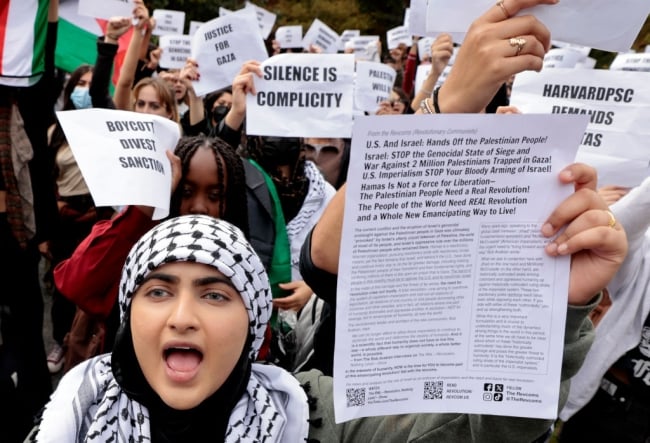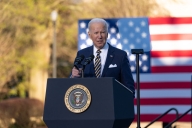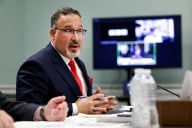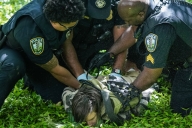You have /5 articles left.
Sign up for a free account or log in.

Protests in support of Palestinian people have broken out on campuses nationwide in the last two months in response to the Israel-Hamas war. How Harvard University leaders and others responded to those protests will be the subject a House hearing today.
Pat Greenhouse/The Boston Globe via Getty Images
Three college presidents will head to Capitol Hill today to defend their responses to campus protests and reported incidents of bias against Jewish students in the wake of the Israel-Hamas war.
Republicans on the House Education and Workforce Committee invited the presidents of Harvard University, the University of Pennsylvania and the Massachusetts Institute of Technology to testify at the hearing, titled “Holding Campus Leaders Accountable and Confronting Antisemitism.” Republicans on the committee have sharply criticized how university leaders have responded to the rise in antisemitic speech, threats and assaults against Jewish students in the past two months.
It’s not entirely clear why these three particular presidents were called to Capitol Hill, considering that many campuses across the country have grappled with protests, rising tensions and finding a balance between promoting free expression and keeping students safe. All three have had high-profile controversies and faced criticism for their responses to the Hamas attack and their handling of protests following the start of the war, but the same has been true for other campuses and presidents.
According to a committee spokesperson, North Carolina representative Virginia Foxx, the top Republican on the committee, “reached out to universities that have been at the center of the rise in antisemitic protests.”
Both Republicans and Democrats likely will have tough questions for the university leaders, who have faced a torrent of criticism, including calls to resign, from students, donors, alumni and faculty members. Some Jewish students have said they don’t feel safe as protests against Israel increase, while students supporting the Palestinian people say their right to free speech is being infringed upon.
Letter to the Editor
A reader has submitted
a letter in response to this
article. You can read
the letter here, and view
all of our letters to the
editor here.
Jan Fansmith, senior vice president of government relations and national engagement at the American Council on Education, said it would be rare but not unprecedented to have a panel entirely comprised of college presidents. The committee’s initial press release didn’t mention whether anyone else would sit alongside the three presidents; however, by Monday, Pamela Nadell, professor of history and Jewish studies at American University, was added to the list as the witness for Democrats.
“Usually witnesses are there to provide greater context, information and verbal perspective—all sorts of things that can inform our understanding of an issue,” Fansmith said. “This seems very clearly meant to be a confrontational hearing.”
This will be the committee’s second hearing in the past month to focus on campus antisemitism. Muslim students also have reported a rise in Islamophobia since the start of the war, which the Education Department has warned about along with the increase in antisemitism. No hearings have been held or scheduled so far to address those concerns.
“College and university presidents have a responsibility to foster and uphold a safe learning environment for their students and staff,” Foxx said in a statement. “Now is not a time for indecision or milquetoast statements. By holding this hearing, we are shining the spotlight on these campus leaders and demanding they take the appropriate action to stand strong against antisemitism.”
Barbara R. Snyder, president of the Association of American Universities, said in a statement to Inside Higher Ed that the hearing will give the three presidents an opportunity to share the positive and constructive ways their universities have dealt with the aftermath of the Oct. 7 attack.
“I hope the hearing will inform the committee about some of the countless ways—from hosting respectful dialogues about the history and context of the Israeli-Palestinian conflict to awareness events to combat antisemitism and Islamophobia—that America’s leading research universities have responded constructively to the unprecedented challenges posed by this crisis,” Snyder said.
The all-woman panel will include presidents who are relatively new to their posts and have little experience testifying before an adversarial congressional committee. The longest-tenured among the three is Penn president Liz Magill, who started in July 2022. She’ll be testifying along with Harvard president Claudine Gay and MIT president Sally Kornbluth. The presidents have said in statements that they look forward to sharing updates and information with the committee.
The Education Department’s Office for Civil Rights is currently investigating allegations of discrimination against Jewish students at Harvard and Penn. Those ongoing investigations could restrict how much the presidents can share about specific situations in the hearing.
The presidents were invited, not subpoenaed, said Nick Barley, a spokesperson for the committee. The committee had the power to subpoena the campus leaders, however, if they declined the initial invitations.
“It’s been pretty clear what the committee’s goal is here and how they’re approaching it,” Fansmith said. “I think the college presidents are going in knowing that this will be a difficult environment, but I think they know that they have a good story to tell if they’re able to tell it and that an open mind will probably learn a lot about the challenges inherent dealing with these situations on a modern college campus.”
Fansmith said some lawmakers see value—whether because of a genuine concern or political positioning—in attacking how colleges and universities have handled “these incredibly complex issues.”
“I have a feeling this hearing is going to reflect that,” he said. “It will be less focused on fact-finding and more focused on drawing attention to the kinds of behavior that certain members of the committee find objectionable.”
Three Campuses in the Headlines
Harvard found itself in the news shortly after the Oct. 7 Hamas attack, when more than 30 student organizations jointly signed a letter that held “the Israeli regime entirely responsible for all unfolding violence.”
Former Harvard administrators and alumni condemned the student letter and called on university leadership to denounce it. Critics also questioned why leaders at Harvard and other well-known institutions waited multiple days to release a public statement on the attack.
Gay, who took over as Harvard president this past summer, explicitly condemned the “terrorist atrocities perpetrated by Hamas” in a second statement released a few days after the initial attack. Some critics had seen her first statement, which didn’t address the student statement, as insufficient.
She later defended Harvard’s commitment to free expression, which sparked more criticism. “That commitment extends even to views that many of us find objectionable, even outrageous,” Gay said in a video statement. “We do not punish or sanction people for expressing such views. But that is a far cry from endorsing them.”
In response to that video, New York representative Elise Stefanik, a Republican on the committee, called on Gay to resign. “Antisemitism should be condemned and NEVER defended as ‘free expression,’” Stefanik wrote on social media.
Harvard has since seen a number of protests in support of the Palestinian people that included rhetoric considered antisemitic by some Jewish students, such as the slogan “from the river to the sea.” An Israeli student alleged he was assaulted physically and verbally when walking through a pro-Palestinian demonstration.
At Penn, Magill found herself in the hot seat even before the Hamas attack, when the university hosted the Palestine Writes Literature Festival in late September. The event featured several speakers “known for espousing anti-Semitic rhetoric,” according to the federal complaint filed by Louis D. Brandeis Center for Human Rights Under Law. Prior to the festival, a swastika was painted in a classroom and the university’s Hillel building was vandalized.
Magill condemned antisemitism but defended the festival, citing the need for a “free exchange of ideas.” Later, after the Hamas attack, she also released a statement to explicitly condemn the violence, labeling it a “terrorist assault,” and clarified that the university didn’t endorse the festival’s speakers. Penn has faced a revolt among donors who took issue with the festival and the university’s response to the Israel-Hamas war.
The Brandeis Center accused Penn of becoming “a magnet for anti-Semites” in a federal complaint that outlined a range of alleged civil rights violations. The Education Department is investigating that complaint.
MIT, meanwhile, reached what Kornbluth called a “low point” on Nov. 9, when students supporting the Palestinian people occupied a building on campus for hours and clashed with counterprotesters. Eventually, worried that the conflict could escalate to violence, university officials ordered the building’s lobby cleared. Students who didn’t leave were suspended from nonacademic campus activities. The suspended students took issue with the punishment, saying they were being penalized for exercising their right to free speech. The students counterprotesting in support of Israel thought the MIT administration didn’t go far enough.
Videos of the protest went viral on social media, boosted by conservative media outlets that said Jewish students had been blocked from attending class. MIT officials said later that while some students felt afraid to walk through the protest, they weren’t aware of any ongoing issue that prevented a student from moving around the campus.
“Because MIT is and must be committed to protecting freedom of expression, the intractability of the opposing viewpoints puts us between a rock and a hard place,” Kornbluth said in a Nov. 14 video. “We have been asked repeatedly to take sides. We have been told that not taking sides is tacitly endorsing one side or the other … Let me emphasize: I am not adjudicating these issues. The whole world is grappling with them. Our role is to find a way to steer the institute through this fraught passage.”
Stephen Joel Trachtenberg, who led George Washington University from 1988 to 2007, said college administrators are torn between two "conflicting" goals in a situation where there’s no right answer.
“There’s nothing that goes into the training of university presidents that prepares them for anything like what’s going on in the Middle East right now and the reactions that are taking place on campus,” he said.
Trachtenberg, who has testified several times before Congress, said that speaking up for their institutions and higher education as a whole is part of the job of university presidents.
“You have to hope you’ll be able to educate as well as take abuse,” he said.
Trachtenberg said he accepted most of his invitations to speak at congressional hearings, though when he declined to speak at one about smoking on campus, he was threatened with a subpoena.
“You can be an advocate for learning and the nature of postsecondary institutions,” he said. “It is true that many of their responses to the crisis are inadequate. They need to recognize that, and they need to repair them the best they can. And they’ll do better in the future—and there will be a future.”








